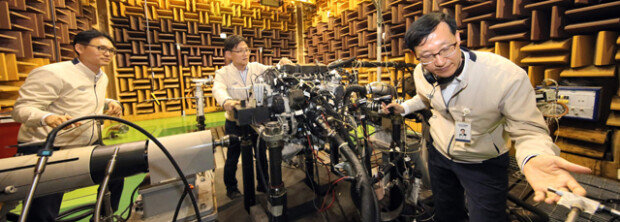Hyundai develops world’s first artificial intelligence auto diagnosis system
Hyundai develops world’s first artificial intelligence auto diagnosis system
Posted July. 20, 2018 07:50,
Updated July. 20, 2018 07:50

Hyundai Motor Co. claims to have become the world’s first automaker to develop technology for using artificial intelligence (AI) and deep learning to determine and diagnose vehicle malfunctions. Hyundai plans to apply the system to all of its service centers across Korea, allowing domestic consumers to witness AI scanning vehicles for malfunctions.
When a Dong-A Ilbo reporter on Tuesday visited an anechoic room of the Engine NVH Research Lab at the Hyundai Kia Motors Namyang Technological Research Center in Hwaseong, Gyeonggi Province, researchers were busy generating sound from a gasoline engine. Chung In-soo, a senior researcher at the lab, placed a long microphone here and there on the engine. To naked ears, it was nothing but a noisy engine. When the sound scope was narrowed down to just where the microphone was put, each part sounded different. The researcher was extracting noise samples that the AI would learn.
Chung and his colleagues created simple sound samples and took them to Chang Joon-hyuk, a professor of electronic engineering at Hanyang University in Seoul. He is one of Korea’s best experts in sound and audio signal processing. They agreed that the project had good potentials and started joint research.
The research was conducted in the order of collecting sound data, analyses of the data, extracting sound characteristics, developing AI software, and actual tests and accuracy enhancement.
Targeting most popularly used gasoline engines, they gathered 830 sound samples and classified them in 18 types and 44 subcategories by component and malfunction pattern. The researchers analyzed the sound samples by splitting them into time and frequency units that the AI can recognize.
The development was followed by getting the AI to “learn.” Once the AI begins its learning, it enhances its own accuracy by going through complicated processes on its own.
Hyundai is seeking patent rights for the invention in various countries including Korea, Germany and Japan. “Our technology will be applied to more fields, as we are collecting other data, including noises from electric vehicle’s motors,” Chung said.
Eun-Taek Lee nabi@donga.com







